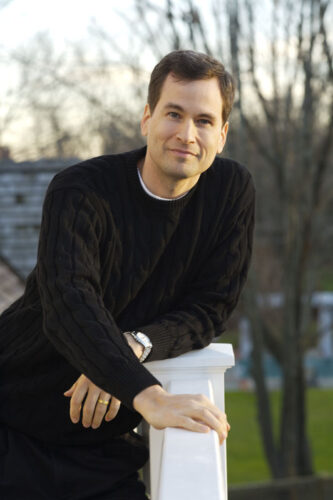David Pogue (YC ’85) is not your average CBS Sunday Morning science and technology correspondent. He’s written or co-written more than 120 books, given five TED Talks, and has hosted twenty NOVA science specials on PBS. All of this makes him uniquely qualified to provide insight into what it’s like to communicate with the larger public through media.After graduating summa cum laude from Yale with a degree in music, Pogue conducted and arranged Broadway musicals for ten years. But on the side, he taught computer lessons. Over a decade, his hundreds of hours of teaching clients—including celebrities—about to use computers gave him a good sense of what the average adult can grasp and how quickly they can grasp it, a skill that would prove useful later in his career.
Pogue also wrote technology review articles on the side. An impressed outgoing tech columnist at the New York Times recommended Pogue to fill his position, where he remained from 2000 to 2013. Pogue got his first break into covering science and the environment when he was approached about hosting a NOVA science special on PBS while at a talk he was giving.
“We had fun working together, so I started doing more shows for them. The areas that they let me cover began to expand: first it was tech, then it was tech and science, then it was tech, science, and environment. So I gradually started doing more stories on plastic in the ocean, and fracking, and the environment. It gradually became part of my portfolio,” Pogue said.
Pogue is now a CBS Sunday Morning science and technology correspondent. What he loves particularly about this position is the creative control and liberty he has when presenting a story. “Being able to choose my own story ideas, the ability to write my own script, the ability to comment on the story as it’s being edited—these are all luxuries you don’t get in other television,” Pogue said.
To cater science for the audience at home, Pogue relies on his experience teaching computer lessons and writing books, six of which have been of the popular For Dummies series. “I like to imagine that it’s me from twenty years ago—before I had gotten into the world of science and technology—in the audience,” Pogue said. Keeping that thought in mind, Pogue is cautious not to under-explain a concept. “I would much rather be accused of over-explaining than shooting over the heads of the audience. If the latter happens, the audience learned nothing and the segment can be considered a failure.”
In Pogue’s mind, explaining key concepts, regardless of how trivial they may seem, is a win-win situation: it allows those who already know the concepts to feel smug about their knowledge, but it also allows those who didn’t know this concept to learn something new. This approach of building a segment while keeping the audience’s perspective in mind, including their ability to understand certain ideas, allows Pogue and his team to effectively and adeptly convey scientific information to viewers.
Pogue acknowledges that there is still room for science writers and reporters to improve. We are, after all, living in a world where more and more people are becoming hesitant to accept scientific findings. According to Pogue, there are two causes of this suspicion. One is that recent scientific findings are new and unfamiliar to many people; the second is that modern science phenomena cannot be seen or observed by the naked eye (e.g., the transmission of the COVID-19 virus from person to person). As Pogue explains, the way to overcome this fear is by relentlessly explaining the facts and significance of these new findings with humor and entertainment value. Importantly, Pogue mentions that science reporters and writers must maintain empathy as well—because a person’s mind will not be changed by facts, but by empathy and understanding. As one of his favorite sayings goes, “People don’t care what you know—unless they know that you care.”
Pogue doesn’t have a specific plan on what he’d like to do in the future. He likes it when life presents a new opportunity. After all, he didn’t plan anything that has happened in his career; he simply said yes to the opportunities presented to him.
As for his advice to today’s scientific writers, Pogue mentioned the necessity of pursuing your passion and trusting that things will turn out all right. “Don’t wait. Don’t think that because you’re young, you can’t do or become or start whatever you want,” Pogue said.

